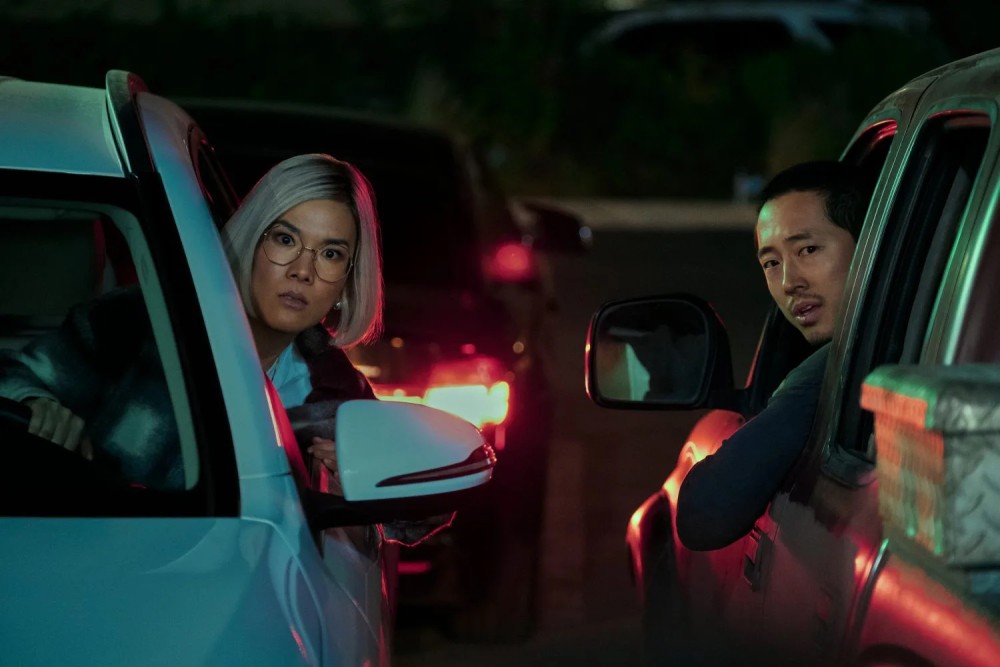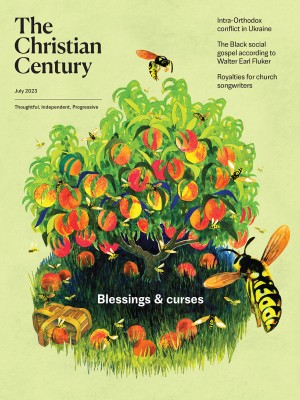
Maybe you’ve heard the advice not to judge strangers who act rudely because you never know their struggles. The barista who ignores your order might be distracted by his mother’s illness; the DMV clerk might snap at you because she’s worried about a sick child or a missed mortgage payment or an alcoholic brother, not your badly done paperwork. Beef (streaming on Netflix) builds an exhilarating, addictive, genre-defying thriller/comedy/drama on this premise. In Beef, however, the main characters don’t extend the benefit of the doubt to each other, no matter how much evidence piles up suggesting they should.
When Danny (Steven Yeun) almost backs his truck into Amy’s (Ali Wong) SUV on his way out of a parking lot, she lays into her horn before speeding off. Just as Amy didn’t pause to consider Danny’s distracted circumstances, Danny does not consider what pain might cause someone to act so aggressively toward a stranger over such a small inconvenience. He instinctively revs his engine and speeds after her.
Read our latest issue or browse back issues.
Each refuses to back down, and their mutual road rage escalates, destroying property, nearly wrecking their cars, and entangling their lives in a kaleidoscope of chaos. As we get sucked in, we can see what Danny and Amy both refuse to acknowledge: they are far more alike in their heartbreaking loneliness and despair than their conflict suggests.
Danny is struggling to keep a construction business afloat and bring his parents back to the US from Korea, where they were forced to retreat when their family hotel business went under. He feels squeezed from every side by his need for money he doesn’t know how to get—and by the sense that no one thinks he’s capable of more than the hard grind that constrains him.
The child of working-class Chinese and Vietnamese parents, Amy now runs a successful houseplant business that she is about to sell for more money than she can imagine. Both her mother-in-law and her controlling business partner make derisive comments about how badly she must want to remodel her home, how happy she must be to finally achieve real success. Amy secretly resents every minute of her working life and longs for exactly what everyone tells her she must be desperate to escape: time with her daughter in the home she already designed just as she liked.
Amy is the instigator of the rage romance that blossoms with Danny—perhaps because the cage is more of her own making, and therefore feels more totalizing. She seems to long for, maybe even seek out, just such unscripted, anonymous moments to thwart the expectations of her perfect, upper-middle-class life. She doesn’t just get pushed to her limit; she craves and relishes the explosion. Danny is more cautious at first, maybe because he was raised in an evangelical church that made him more suspicious of his baser instincts. But once invited into Amy’s anger spiral, he finds a new capacity for rage and destruction one senses has always been under the surface.
Hate, like love, turns out to be a many-splendored thing, and the deeper Amy and Danny go in their vengeful spite, the more intricately their lives become entangled. Each plot twist follows naturally from the sequence of events that sets it in motion, and the show hews to this law of unfolding with breathtaking commitment that left me slack-jawed in amazement.
Ruses of modern life allow Amy and Danny to conceal themselves even from themselves. Some of these are well-worn plot devices, like when Amy and her husband George (Joseph Lee) undertake marriage counseling exercises that leave them lying to each other in an effort to appear transparent and generous. Or the way parents hide behind “the good of the child” to avoid confronting their own fears and resentments.
Other plots feel new and relatively untapped in popular culture, like when Danny returns to his evangelical roots both because he is desperately seeking real peace and because he wants to prove he’s made something of himself. I am not sure I have ever seen on television such a perfect depiction of how getting lost in a praise song can be both catharsis and self-deception. Whether it is in a perfectly executed smile or a head lifted in song, Danny and Amy are both desperate to mask the depths of seething turmoil.
Layered on top of these masks, or maybe foundational to all of them, is the added burden Danny and Amy carry as Asian Americans. Each is aware that anger is one of the emotions often denied Asians in cultural scripts. “You have this serene Zen Buddhist thing going on,” Amy’s potential business partner tells her a few hours after her road rage incident. A calm smile plastered to her face, Amy leans into the stereotype. “Most people just don’t understand that anger is just a transitory state of consciousness,” she says calmly to a neighbor, who eats it up like a spiritual mantra.
Many narratives ask how far otherwise good people might go if pressed to their limits, and Amy and Danny are being pressed. But Beef is more interested in asking whether Amy and Danny are good people to begin with. What if their beef with each other is the truest thing about either of them, the focal point by which they come to see themselves clearly?
Their anger, then, isn’t just release from cultural expectations and the falseness of modern life; it forces them to confront personal demons and shortcomings long buried. By the end of the series, anger is a purifying fire —unbelievably destructive and dangerous, but also revealing, healing, and maybe even containing a kind of grace.






